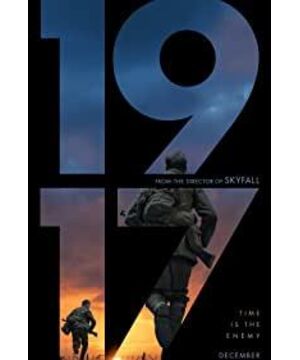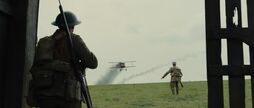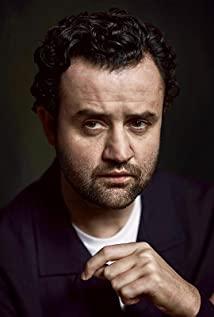8.0/10
A film that is technically perfect, but ideologically tedious and meaningless—no wonder its Oscar wins are all technical.
1917 is exactly what Martin Scorsese describes as an "amusement park/theme park movie" - it's naturally reminiscent of Disneyland rides like "Pirates of the Caribbean" or "Jungle Adventure" ——Only here, the historical background has been replaced by the First World War. The one-shot design gives the whole film a strong sense of game and immersion, and also makes time and space particularly sensitive elements in the film. Due to his previous experience as a drama director, Sam Mendes has a free sense of control over the passage of real time; however, for the passage of time in 1917, it is obviously different from the absolute faithfulness in "Cleo at 5 to 7" time record. The whole film is divided by the black screen after the protagonist falls from the building. The first shot in the first half is similar to a sniper game from a third-person perspective, as if the audience follows the two as the third person in the team -- when the second The momentary darkness that appears when people enter the cave to cover the editing point is like a transitional empty space when changing scenes in a single-player game; while the mirror movement in the second half of the time is more ghostly and subjectively ambiguous. , especially after the protagonist wakes up, for the first time, the camera did not strictly follow his footsteps, but passed a window on the second floor attic, and immediately shot down the protagonist walking out of the downstairs-at this moment , we cannot assert that this viewpoint belongs to any meaningful individual.
As the biggest gimmick of the whole film, the one-shot-to-the-end form makes the whole film show a kind of Suzhou garden-style moving scene-the director and cameraman seem to be eager to show the audience a unique magician, or a small and medium-sized theme park. The tour guide on the train tirelessly takes the audience on a tour of its pre-prepared "events" that take place in various scenarios - it may be a landmine that suddenly explodes, or a plane that crashed in front of him, and Or the wheel that is stuck in the quagmire and difficult to pull out - for the audience, surprise or fright are accomplished through some kind of physical stimulation, such as a sudden explosion or a sudden "scare". "The audience, but the entire film text itself does not have any real sense of unknown - when we see that Schofield is the first to suffer disaster and Blake rescues him, it is almost certain that the latter will be sacrificed first; and when Schofield carries As Blake's legacy continues on this "unknown" journey, we can assert that he will eventually succeed, and the obstacles encountered along the way are relative to his unmistakable destiny in the story. It's just a song and dance performance with food. Thus, 1917 does not attempt to provide the audience with a real, open space; on the contrary, its world is a monotonous, linear passage from A to B, like an oil pipeline or It is a labyrinth in an amusement park. Even though there will be endless twists and turns in the process, its starting and ending points are definite and unique, and there is no room for any side branches and tuber-like connections - in this sense, it is Dele The strict rootbook/rootbook criticized here cannot inspire any constructive (or deconstructive) thought, and the only thing it can do is to give the audience a grand moving and spiritual massage.
A deeper concern for the film is that the historical context on which 1917 is based, World War I, is fundamentally different in nature from World War II, the inspiration for more war movies: we can almost It is asserted that World War I was a war without any inevitability, necessity, legitimacy, or even tragedy. Unlike the reflection and glorious praise of the ugliness of human nature that were naturally rooted in World War II, the background of World War I was absurd rather than tragic. Tragically, it has an absurd opening and a dismal curtain call, and the price of this farce is the annihilation of tens of millions of lives and the pain of a generation.
The photography and lighting of Roger Deakins has become a perfect place, with Thomas Newman's appropriate soundtrack, it is impeccable in mobilizing the audience's emotions through audio-visual language; however, it carries such a barren story - it can be said that Sam What Mendes chose was a "right" story that couldn't pick out anything wrong, and it just reflected the monotony and lacklusterness of the story itself.
View more about 1917 reviews










